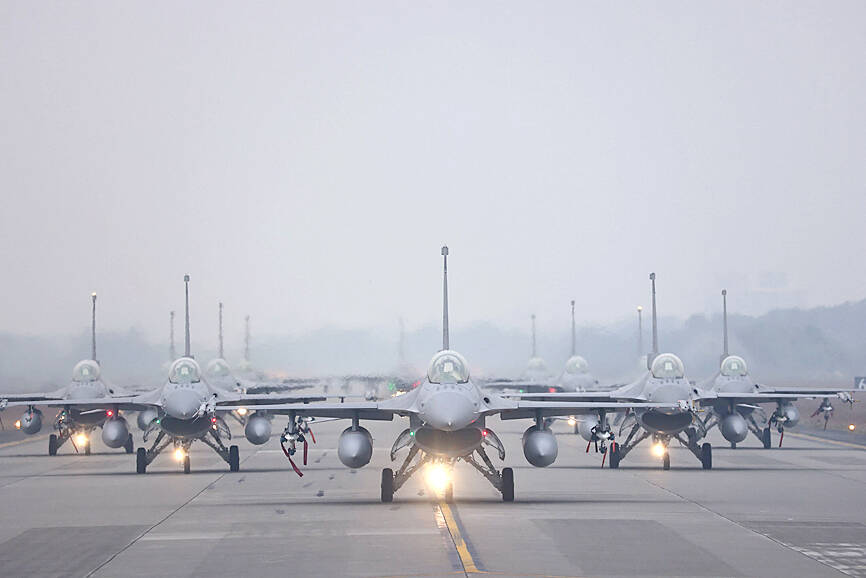The backlog of US arms sales to Taiwan is worth US$19.17 billion, with F-16s and Abrams tanks making up more than 50 percent of the value, the Cato Institute said in a study published on Monday.
The study drew data from the US Department of Defense’s Defense Security Cooperation Agency and the Stockholm International Peace Research Institute.
Washington has not released detailed information on delayed arms shipments.

Photo: Ann Wang, Reuters
The Cato Institute broke down the arms backlog into “traditional,” “asymmetric” and “munition” weapons categories and capabilities, with traditional being 63.2 percent of the total, asymmetric comprising 22 percent and munitions 14.8 percent, the study said.
The undelivered traditional capabilities, totaling US$12.113 billion, mainly consisted of US$8 billion of F-16C/D Block 70 jets and US$2 billion of M1A2T Abrams tanks, it said.
The undelivered traditional capabilities also included M109A6 Paladin self-propelled howitzers comprising 3.9 percent of the total backlog, while infrared search and track systems for F-16s comprised 2.6 percent and MK 15 Phalanx close-in weapon systems comprised 2.2 percent, it said.
The traditional capabilities delayed also included MS-110 jet reconnaissance pods (1.9 percent) and AN/SLQ-32 electronic warfare systems for Keelung-class destroyers (0.4 percent), the study said.
However, the backlogged traditional systems would have imposed a high cost on Taiwan’s limited defense resources and would be of “minimal utility” in fighting the Chinese the People’s Liberation Army, it said.
The US should prioritize the delivery of asymmetric capabilities and ammunition “to keep Taipei from running out of reloads quickly in a conflict,” the study said.
The asymmetric capabilities, worth US$4.221 billion, included Harpoon coastal defense systems totaling US$2.37 billion, or 12.4 percent of the backlog, it said.
The undelivered asymmetric capabilities also included MQ-9B uncrewed aerial vehicles comprising 3.1 percent of the backlog and High Mobility Artillery Rocket Systems comprising 2.3 percent, it said.
Air-launched Harpoon missiles comprised 1.9 percent of the backlog, Field Information Communication Systems comprised 1.5 percent and Volcano anti-tank mining systems comprised 0.9 percent, it added.
Munitions not yet delivered totaled US$2.835 billion, including AGM-84H SLAM-ER missiles worth US$1.008 billion, or 5.3 percent of the backlog, as well as F-16 munitions comprising 3.2 percent, it said.
In addition, MK 48 heavyweight torpedoes, 30mm rounds, AGM-154C Joint Standoff Weapons, lightweight torpedoes and conversion kits, and AIM-9X Block II missiles accounted for 2.2 percent, 2.2 percent, 1.7 percent, 1 percent, 0.9 percent and 0.4 percent of the backlog respectively, the study said.

AIR SUPPORT: The Ministry of National Defense thanked the US for the delivery, adding that it was an indicator of the White House’s commitment to the Taiwan Relations Act Deputy Minister of National Defense Po Horng-huei (柏鴻輝) and Representative to the US Alexander Yui on Friday attended a delivery ceremony for the first of Taiwan’s long-awaited 66 F-16C/D Block 70 jets at a Lockheed Martin Corp factory in Greenville, South Carolina. “We are so proud to be the global home of the F-16 and to support Taiwan’s air defense capabilities,” US Representative William Timmons wrote on X, alongside a photograph of Taiwanese and US officials at the event. The F-16C/D Block 70 jets Taiwan ordered have the same capabilities as aircraft that had been upgraded to F-16Vs. The batch of Lockheed Martin

GRIDLOCK: The National Fire Agency’s Special Search and Rescue team is on standby to travel to the countries to help out with the rescue effort A powerful earthquake rocked Myanmar and neighboring Thailand yesterday, killing at least three people in Bangkok and burying dozens when a high-rise building under construction collapsed. Footage shared on social media from Myanmar’s second-largest city showed widespread destruction, raising fears that many were trapped under the rubble or killed. The magnitude 7.7 earthquake, with an epicenter near Mandalay in Myanmar, struck at midday and was followed by a strong magnitude 6.4 aftershock. The extent of death, injury and destruction — especially in Myanmar, which is embroiled in a civil war and where information is tightly controlled at the best of times —

Taiwan was ranked the fourth-safest country in the world with a score of 82.9, trailing only Andorra, the United Arab Emirates and Qatar in Numbeo’s Safety Index by Country report. Taiwan’s score improved by 0.1 points compared with last year’s mid-year report, which had Taiwan fourth with a score of 82.8. However, both scores were lower than in last year’s first review, when Taiwan scored 83.3, and are a long way from when Taiwan was named the second-safest country in the world in 2021, scoring 84.8. Taiwan ranked higher than Singapore in ninth with a score of 77.4 and Japan in 10th with

SECURITY RISK: If there is a conflict between China and Taiwan, ‘there would likely be significant consequences to global economic and security interests,’ it said China remains the top military and cyber threat to the US and continues to make progress on capabilities to seize Taiwan, a report by US intelligence agencies said on Tuesday. The report provides an overview of the “collective insights” of top US intelligence agencies about the security threats to the US posed by foreign nations and criminal organizations. In its Annual Threat Assessment, the agencies divided threats facing the US into two broad categories, “nonstate transnational criminals and terrorists” and “major state actors,” with China, Russia, Iran and North Korea named. Of those countries, “China presents the most comprehensive and robust military threat